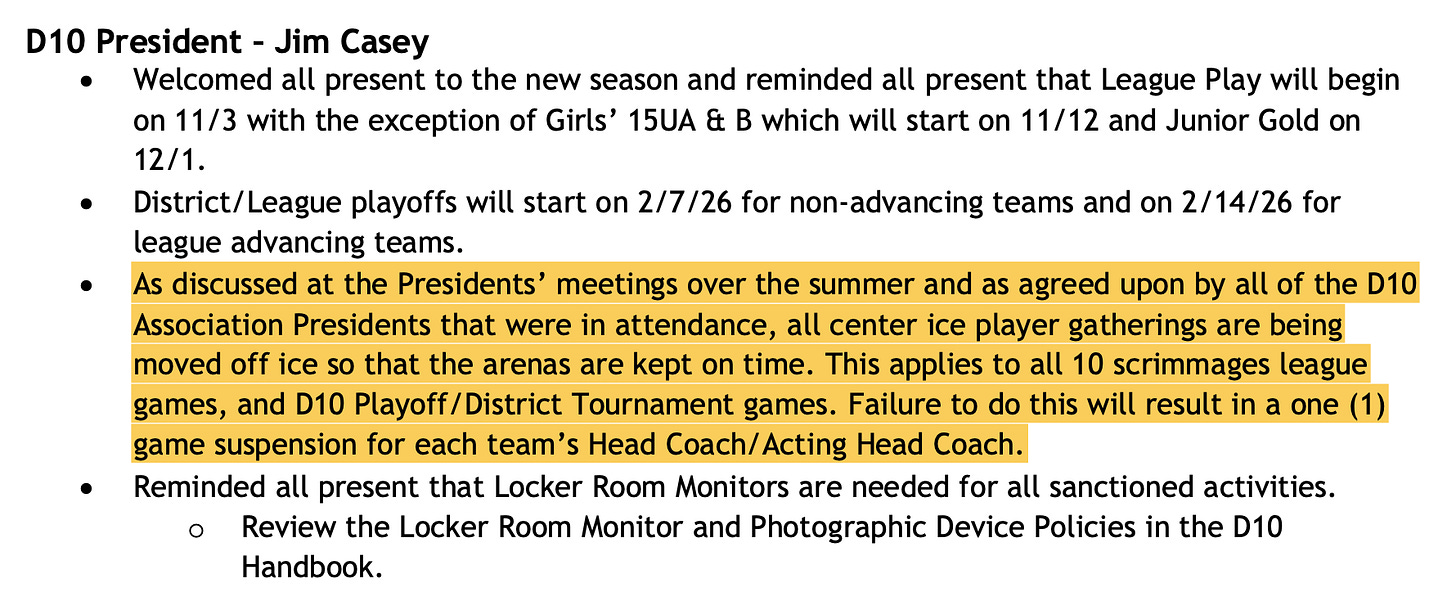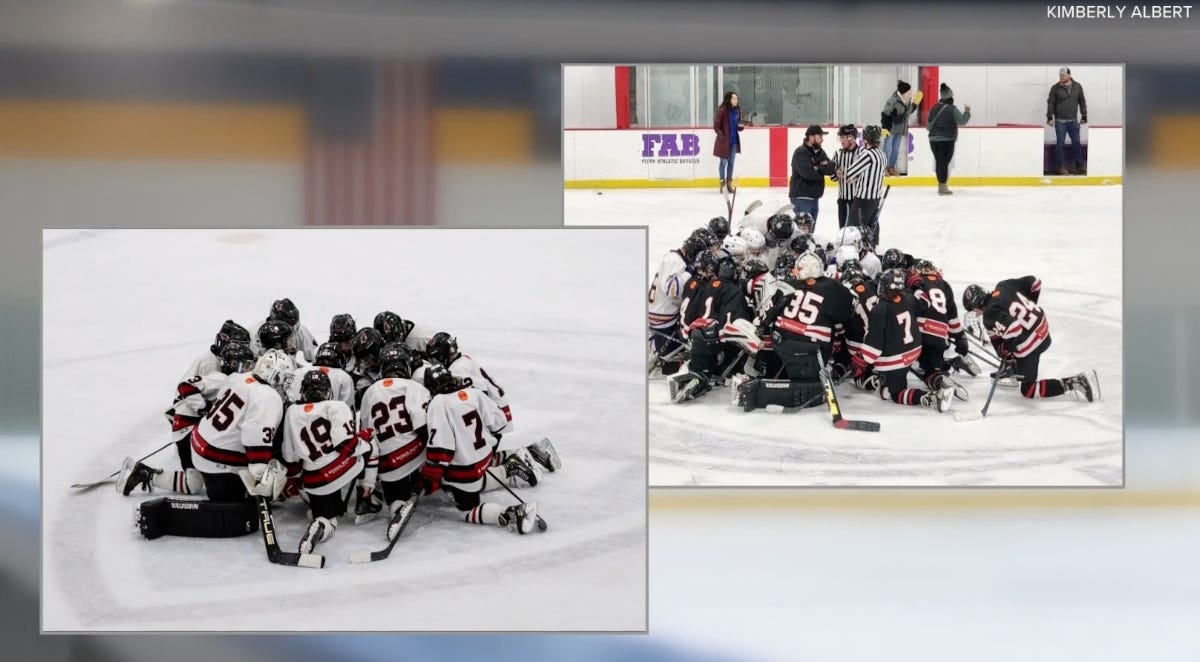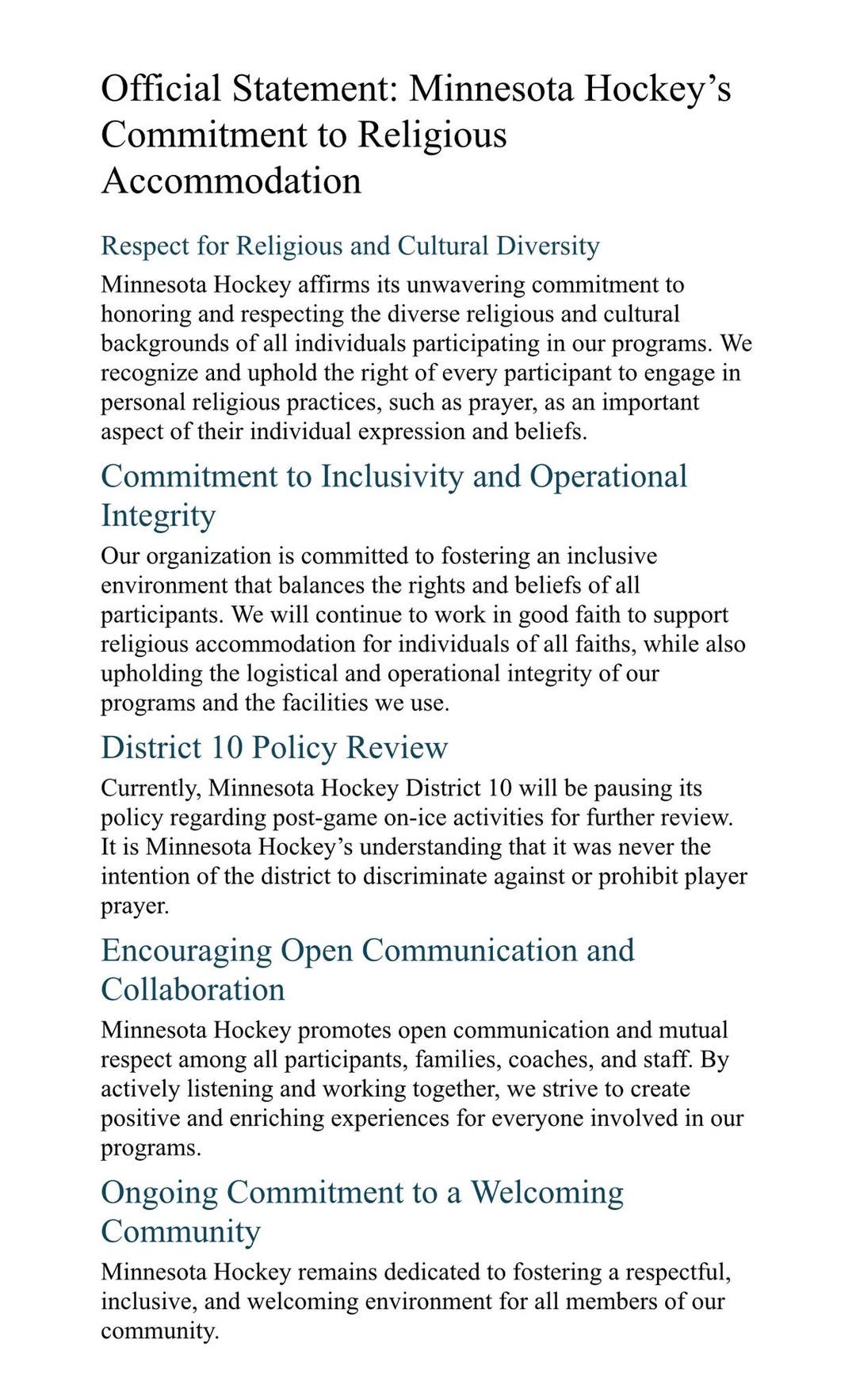A Minnesota youth hockey league wanted to clear the ice after games. Christians flipped out.
A new policy meant to speed up down time between kids' hockey games got twisted into a culture war battle
This newsletter is free and goes out to over 22,000 subscribers, but it’s only able to sustain itself due to the support I receive from a small percentage of regular readers. Would you please consider becoming one of those supporters? You can use the button below to subscribe or use my usual Patreon page!
A Minnesota community hockey league is being criticized after they instituted a policy to clear the ice more quickly after games… which some religious conservatives claimed was an attack on their religious freedom. The league—clearly not expecting the backlash—has now put its policy on hold.
All of this involves District 10, an affiliate of Minnesota Hockey, just north of Minneapolis. Kids in that area play hockey like kids in other cities play soccer. And if you’ve ever watched youth sports, you know that after a game is over, the players from both teams typically shake hands and say “good game” to their opponents, or some variation of that.
That’s what they do in this league, too. But in addition to the good sportsmanship, there’s been a recent tradition of teams gathering at center ice and saying a prayer together.
It appears this is player-led, and adults aren’t participating, so that’s not the issue. This isn’t a legal problem. But there is another problem.
Imagine you’re a schedule coordinator for the league. In any given rink, you have to cram in a certain number of games in a day. So you schedule one for an hour. After that, you allow a bit of time for a zamboni to clean the rink and for the next teams to begin their warm-ups… and then the next game needs to begin on time. Small delays can add up quite a bit.
Earlier this month, the board of directors for District 10 announced a change in policy to address those delays: Once your game is over, get off the ice.
As discussed at the Presidents’ meetings over the summer and as agreed upon by all of the D10 Association Presidents that were in attendance, all center ice player gatherings are being moved off ice so that the arenas are kept on time. This applies to all 10 scrimmages league games, and D10 Playoff/District Tournament games. Failure to do this will result in a one (1) game suspension for each team’s Head Coach/Acting Head Coach.
Not only was this a sensible policy, it was unanimously supported when the group met over the summer. I’m not just speculating about their reasons for this, either. One of the people who voted for that rule explained his reasoning:
“By the time a circle starts to form or something like it, it really is going to take a couple of minutes. Right at the end of the hour, the ice doors have to open—the Zamboni has to start the cleaning process—they only get 10 minutes. If they’re a minute late, the next session is going to start late,” [Jeff] Meister, who is a board member with Blaine Youth Hockey, said.
As soon as the new policy was announced, though, Christians began whining that this was part of an attempt to shut down prayers.
… for many families, the decision seemed directly aimed at ending the tradition of post-game prayer circles, which are led by players and typically last less than a minute.
“It felt like they were just trying to sneak it through as something minor,” said Cameron Carson, whose two daughters play in District 10. He explained that after the handshake line, players usually kneel at center ice with arms around each other for a brief prayer before returning to their teams.
…
“It really loses its meaning when you take that step away from center ice,” said Chris Sigrudson, whose four sons grew up on the ice. Sigurdson says he has seen these prayer circles hundreds of times and that they are something that happens in the moment right after the heat of battle.
“It’s that moment of deep appreciation and reflection before interruptions with parents and coaches and all the outside noise,” he said.
…
“These prayer circles are led by the players and are wildly popular. I bet over 80 percent of each team participates,” one tipster told Alpha News.
“Anyone who has witnessed these knows the truth: team prayer circles are respectful, voluntary, and take less than one minute. This is not about time. This is about silencing public expressions of faith,” said another tipster.
If you think a group prayer “loses its meaning” if you can’t do it publicly, then just admit this is about satisfying your ego, not about faith. There’s absolutely no reason anyone who wants to pray can’t do it off the ice, or in the locker room, or outside the rink with the other team. Or, you know, privately, anytime and anywhere they want. (Unless they want to admit that their God is too weak to hear those prayers.)
It’s irrelevant that these prayers are short because the issue here is the added delay. Better to get everyone off the ice quickly, as soon as possible, than to allow them to linger for any reason. It’s not anti-religious. It’s pro-logistics.
On Thursday night, however, Minnesota Hockey released a statement saying they were putting that end-of-game policy on hold “for further review” and that they fully support religious freedom. (As if that was ever truly in doubt.)
Minnesota Hockey affirms its unwavering commitment to honoring and respecting the diverse religious and cultural backgrounds of all individuals participating in our programs. We recognize and uphold the right of every participant to engage in personal religious practices, such as prayer, as an important aspect of their individual expression and beliefs.
…
Currently, Minnesota Hockey District 10 will be pausing its policy regarding post-game on-ice activities for further review. It is Minnesota Hockey’s understanding that it was never the intention of the district to discriminate against or prohibit player prayer.
Of course it wasn’t their intention to discriminate against anyone, and the policy doesn’t do that. But religious zealots always believe they’re victims of persecution even when the issue is as dull as scheduling hockey games effectively.
District 10 itself issued a separate statement on their website saying their goal is to “keep the arenas on time for games, scrimmages, and practices, along with keeping accommodation of an area for prayer or player gatherings.” (Yeah, of course it is.)
None of this backlash needed to happen because the policy some loud voices online are mad about is a rational one. This entire fake controversy is a reminder of how we live in a society where Christian activists twist ordinary, practical decisions into fictional assaults on their faith. They can’t tell the difference between genuine oppression and a minor inconvenience. For those who thrive on grievance, no policy is too small to spin into a culture war crusade.
I don’t believe that Minnesota Hockey needed to back down because their policy was a neutral one and would have withstood legal scrutiny, but the people in charge of these groups are volunteers who just want to run a children’s league, not get dragged into a legal battle, so it’s understandable why they capitulated immediately. By doing that, though, they reinforced the false narrative that any boundary placed around public displays of faith is inherently hostile toward faith itself.
Nothing could be further from the truth. Players were always free to pray—and they still are. The only request was that those prayers (and any other center-ice gatherings) don’t delay everyone else.
This controversy doesn’t expose anti-Christian bias. It exposes how entitled and fragile some Christians have become, insisting their rituals take precedence over common sense.





Remember Jesus, assholes? The guy you all claim to follow? He had things to say about people who had to put their piousness on display in front of everybody, and you know what? He didn’t approve.
Here it is IN HIS OWN WORDS:
5 And when thou prayest, thou shalt not be as the hypocrites are: for they love to pray standing in the synagogues and in the corners of the streets, that they may be seen of men. Verily I say unto you, They have their reward.
6 But thou, when thou prayest, enter into thy closet, and when thou hast shut thy door, pray to thy Father which is in secret; and thy Father which seeth in secret shall reward thee openly.
The Gospel of St. Matthew, Chapter 6, Verse 5-6
If you believe in the Bible, there it is. Straight from the Savior’s mouth.
Run the Zamboni regardless. Problem solved.